Cat Throws Up Food: Understanding the Causes and Solutions
When your cat throws up food, it can be a source of concern for you as a pet parent, prompting questions about your cat's health and well-being. While occasional vomiting might not indicate a serious problem, frequent or chronic vomiting requires attention. It's essential to distinguish between a simple upset stomach and more severe conditions that could be underlying causes for concern.
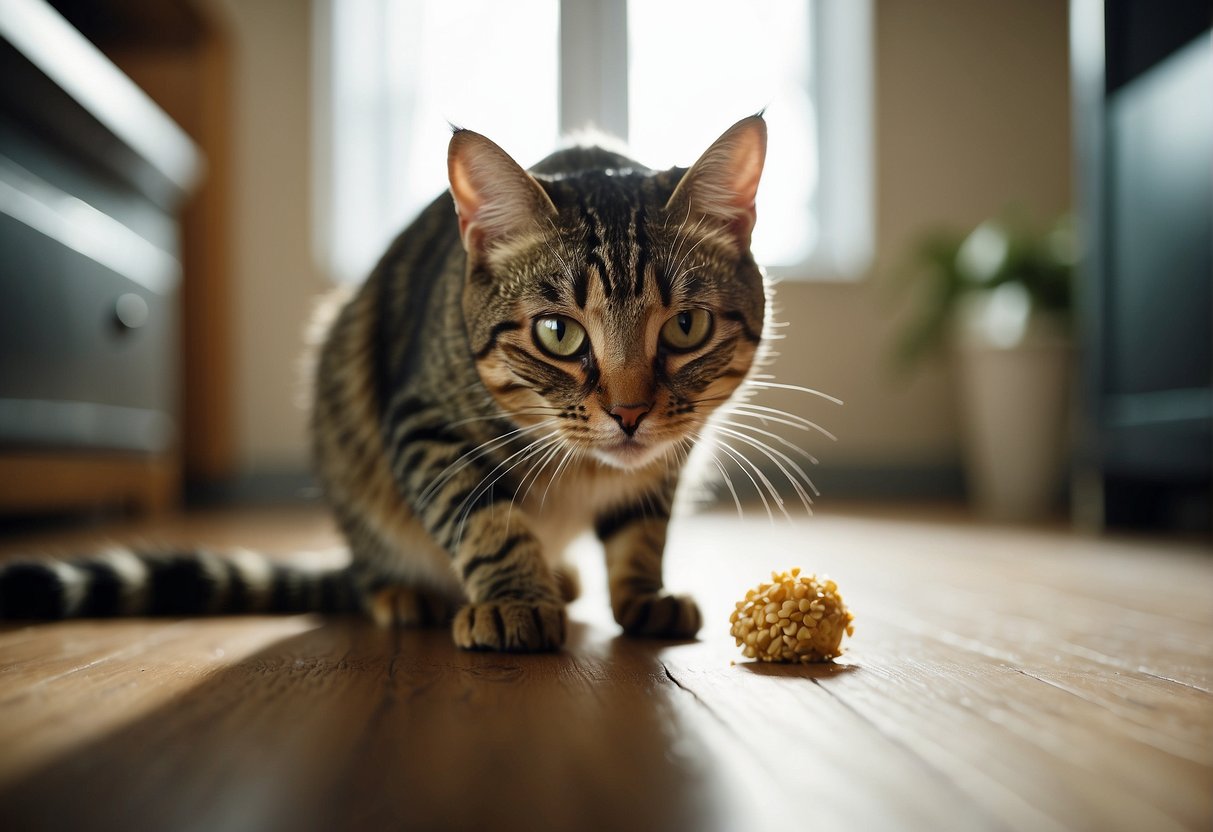
Vomiting in cats can occur due to various reasons, ranging from dietary indiscretion to more serious health issues such as kidney disease or intestinal parasites. Understanding the difference between vomiting and regurgitation, as well as the types of vomit, can give you insights into your pet's health. If you notice persistent vomiting, especially after every meal, it’s crucial to consult a veterinarian for a proper diagnosis and treatment.
Key Takeaways
- Vomiting in cats can signal anything from a minor issue to a serious health condition.
- It is important to monitor your cat's vomiting patterns and frequency.
- Consulting with a veterinarian is vital for diagnosis and to ensure proper treatment.
Understanding Cat Vomiting
Vomiting in cats can be concerning. Distinguishing between vomiting and regurgitation, understanding the causes, and knowing when to seek veterinary assistance are crucial components of responsible cat ownership.
Difference Between Vomiting and Regurgitation
Vomiting typically involves nausea, retching, and heaving, indicating an active process in which your cat will often vocalize and appear uneasy prior to the incident. In contrast, regurgitation is a relatively passive process that usually happens soon after eating and without the same preliminary signs of distress.
Common Causes of Vomiting in Cats
Vomiting can arise from a variety of reasons, ranging from harmless to more severe conditions:
- Faster Eating: If your cat consumes food too quickly, it may regurgitate undigested food almost immediately.
- Dietary Issues: Abrupt diet changes, eating toxic substances, or food sensitivities can all lead to vomiting.
- Health Conditions: Intestinal obstructions, inflammatory bowel disease, and organ diseases such as kidney or liver issues are serious causes that necessitate prompt veterinary attention.
When to Seek Veterinary Help
You should contact your veterinarian if:
- Vomiting persists beyond 24 hours
- Your cat exhibits additional signs of illness (lethargy, diarrhea, etc.)
- You observe your cat vomiting after every meal, as this suggest a more severe issue.
It is essential to monitor your cat's vomiting patterns and report any concerns to a veterinarian, who can provide a thorough assessment and the appropriate treatment.
Health Conditions Related to Vomiting
When your cat vomits, it can be a symptom of various health issues, ranging from mild to severe. This section will guide you through some specific health conditions that might lead to vomiting in felines.
Digestive System Issues
Hairballs are common in cats and result from grooming and swallowing hair. Although not typically serious, they can cause vomiting. Inflammatory Bowel Disease (IBD) is another condition where chronic inflammation of the digestive tract leads to vomiting. Gastroenteritis, an inflammation of the stomach and intestines often caused by an infection or ingestion of toxins, can also result in your cat throwing up.
Chronic Diseases and Vomiting
Chronic conditions such as kidney disease and hyperthyroidism may exhibit vomiting as a symptom. Kidney disease affects the removal of waste from the blood, and hyperthyroidism—an overactive thyroid gland—can disrupt your cat's metabolism. Both conditions require veterinary attention.
Foreign Objects and Blockages
If your feline friend is vomiting due to eating something they shouldn't have, this might be due to foreign bodies causing an intestinal obstruction. This is serious and can be life-threatening, requiring immediate veterinary care. Signs of a blockage include persistent vomiting, especially after eating.
It's important to consult your vet if your cat experiences frequent vomiting, as it can signal something more serious, such as a blockage or underlying illness.
Diet and Nutritional Factors
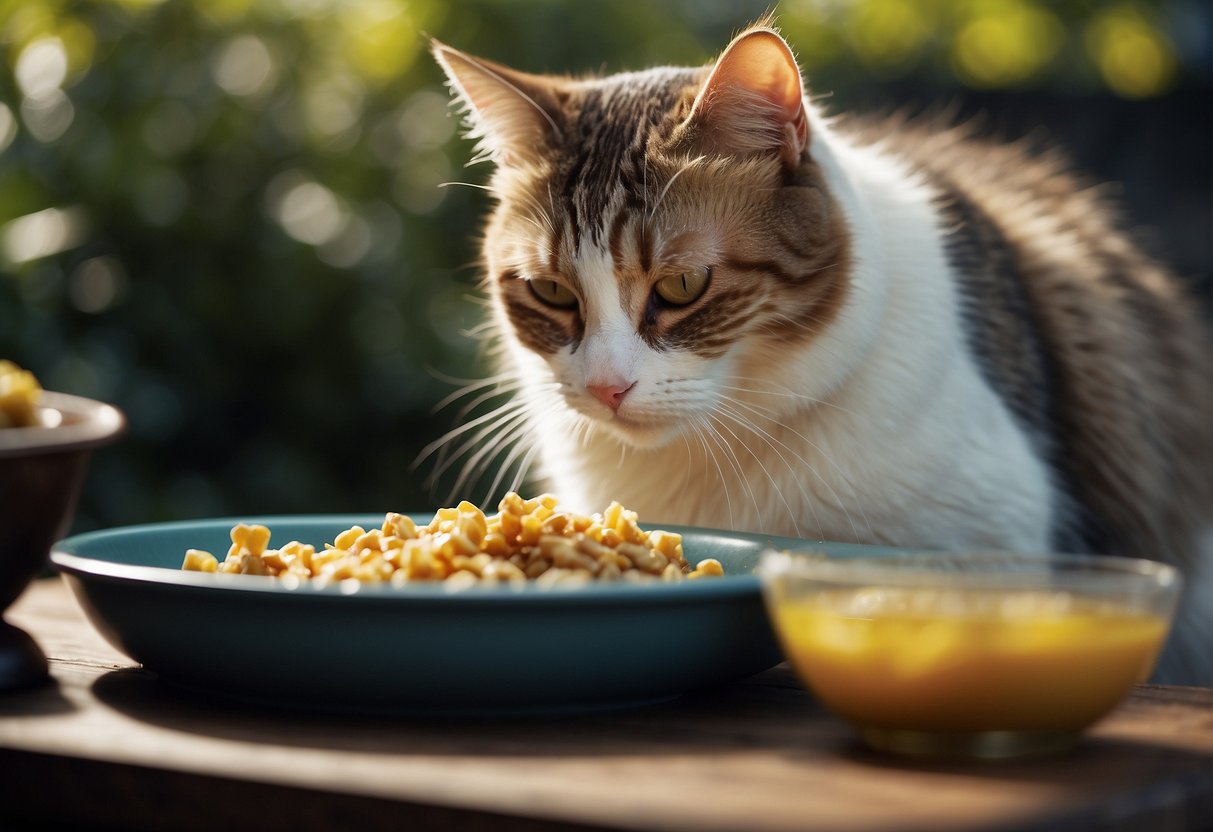
When your cat throws up food, it's important to scrutinize their diet and eating habits closely, as these elements are often at the core of the issue.
Inappropriate Diet and Food Allergies
If your cat is vomiting undigested food, it might signal an inappropriate diet or a food allergy. Sensitive stomachs in cats are not uncommon, and the introduction of new cat food or a diet that doesn't align with their nutritional needs can lead to digestive discomfort. When selecting cat food, it's imperative to ensure it meets your pet's dietary requirements. If you're transitioning to a new food, do so gradually, mixing it with the old kibble to facilitate a smooth changeover and minimize the risk of an upset stomach.
The Impact of Eating Habits
Another factor to consider is eating too fast. Cats that gulp their food can ingest air, which may cause them to regurgitate undigested food shortly after eating. Implementing a special diet that includes smaller, more frequent meals, or using slow feeder bowls, can aid in managing this behavior. Be observant of how swiftly your cat eats, as a measured pace can help prevent regurgitation and promote better digestion.
Diagnosis and Treatment Options
When your cat is throwing up food, it's important to understand the underlying causes and the available treatments. A prompt diagnosis by a veterinarian is vital, as it guides the effective management and resolution of your cat's symptoms.
Veterinary Diagnostic Approaches
Your first step should always be to consult with a veterinarian. They will likely begin with a thorough physical exam to check for any obvious signs of illness. A series of diagnostic tests may follow, such as blood tests, urinalysis, and x-rays to look for signs of systemic illness, obstructions, or other medical conditions. These tests help to pinpoint the exact cause of your cat's vomiting.
Common Treatments for Vomiting
The treatment for your cat's vomiting will be based on the diagnosed cause:
- For cases of dehydration, hydration therapy may be necessary.
- Physical obstructions may require medical intervention, possibly surgery.
- If the vomiting is due to diet or parasites, adjusting your cat's diet or medications may be recommended.
- In cases of illness, supportive care and prescription medications targeting the underlying condition can help.
It is critical that treatment is initiated as soon as a diagnosis is made to give your cat the best chance at a full recovery.
Preventing Cat Vomiting
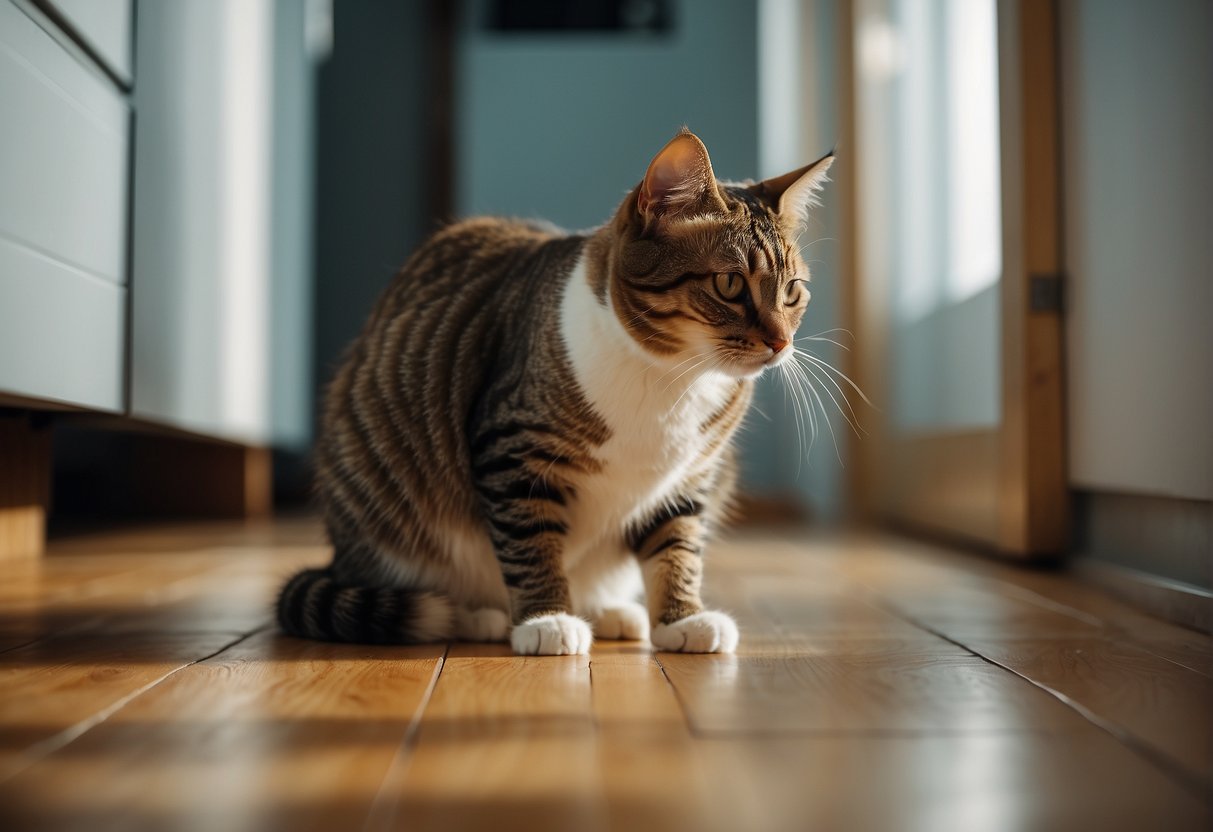
In addressing cat vomiting, it's crucial to focus on prevention through environmental control and dietary management. By implementing specific measures at home and making essential lifestyle alterations, you can help reduce the occurrence of this distressing symptom.
Preventative Measures at Home
Feeding: Moderation is key. Feed your cat smaller meals throughout the day to ease digestion and lower the risk of vomiting. A schedule creates consistency, making mealtime regular and predictable, which can reduce stress-related vomiting.
Safe Environment: Streamline your cat's environment, removing plants and household items, like hair ties and toys, which could be accidentally ingested, leading to gastrointestinal blockage and subsequent vomiting.
Water Access: Ensure that your cat has constant access to fresh water. Hydration plays a vital role in preventing vomiting by supporting healthy digestion and kidney function.
Lifestyle Changes for Vomiting Prevention
Diet: Be cautious with human foods; several are toxic to cats and can cause vomiting. Introduce new foods gradually, and consult your vet on hypoallergenic diets if food sensitivities are suspected.
Stress Reduction: Minimise your cat's stress with a consistent routine and a peaceful home environment. Stress can lead to vomiting, so it's essential to keep your cat comfortable.
Chemicals: Keep cleaning agents and other chemicals out of reach. Exposure to toxic substances can result in vomiting and require immediate veterinary care.
Remember, these interventions are general guidelines. Consult your veterinarian for advice tailored to your cat's specific health needs.
Aftercare and Recovery
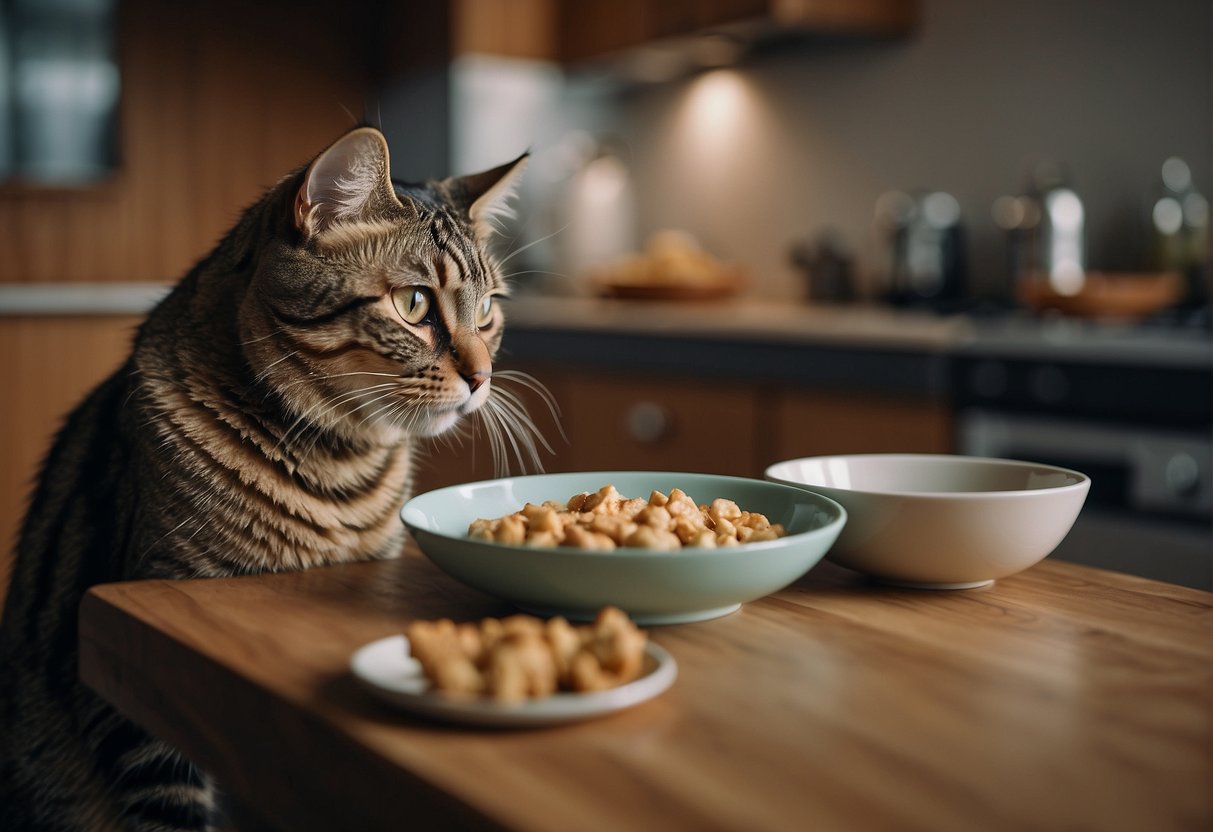
After your cat has received treatment for vomiting food, your primary focus should be on ensuring a smooth recovery and preventing recurrence. This includes careful post-treatment care and consistent monitoring of your cat's health.
Post-Treatment Care
Initially, adjust your cat's diet based on your vet's recommendations—this may involve feeding a bland or a prescription diet to soothe their digestive system. Gradually reintroduce their regular food over several days. Ensure easy access to water to avoid dehydration, as it's essential for your cat's recovery.
If your cat was prescribed medication, administer it as directed, without skipping doses. Create a comfortable resting area to help your cat relax and recover without stress. Look out for signs of constipation or diarrhea, as they can indicate complications.
Monitoring and Maintaining Cat Health
Monitor your cat closely for signs that could suggest their condition is not improving:
- Weight loss: A continuous decrease in weight could signal that your cat is not recovering properly.
- Appetite: If your cat's appetite doesn't return to normal, it may indicate underlying issues.
- Lethargy: Persistent lack of energy is a cause for concern.
- Other symptoms: Persistent vomiting, difficulty in breathing, drool, or the presence of bile in the vomit require immediate veterinary attention.
Maintain a regular feeding schedule and control meal portions to prevent overeating and reduce the risk of vomiting. Weight management through a balanced diet and regular exercise can help avoid obesity-related health concerns.
Consistent veterinary check-ups are vital to ensure a complete recovery and to monitor your cat's overall health. Record any changes in behavior or symptoms and report them to your veterinarian.
Frequently Asked Questions
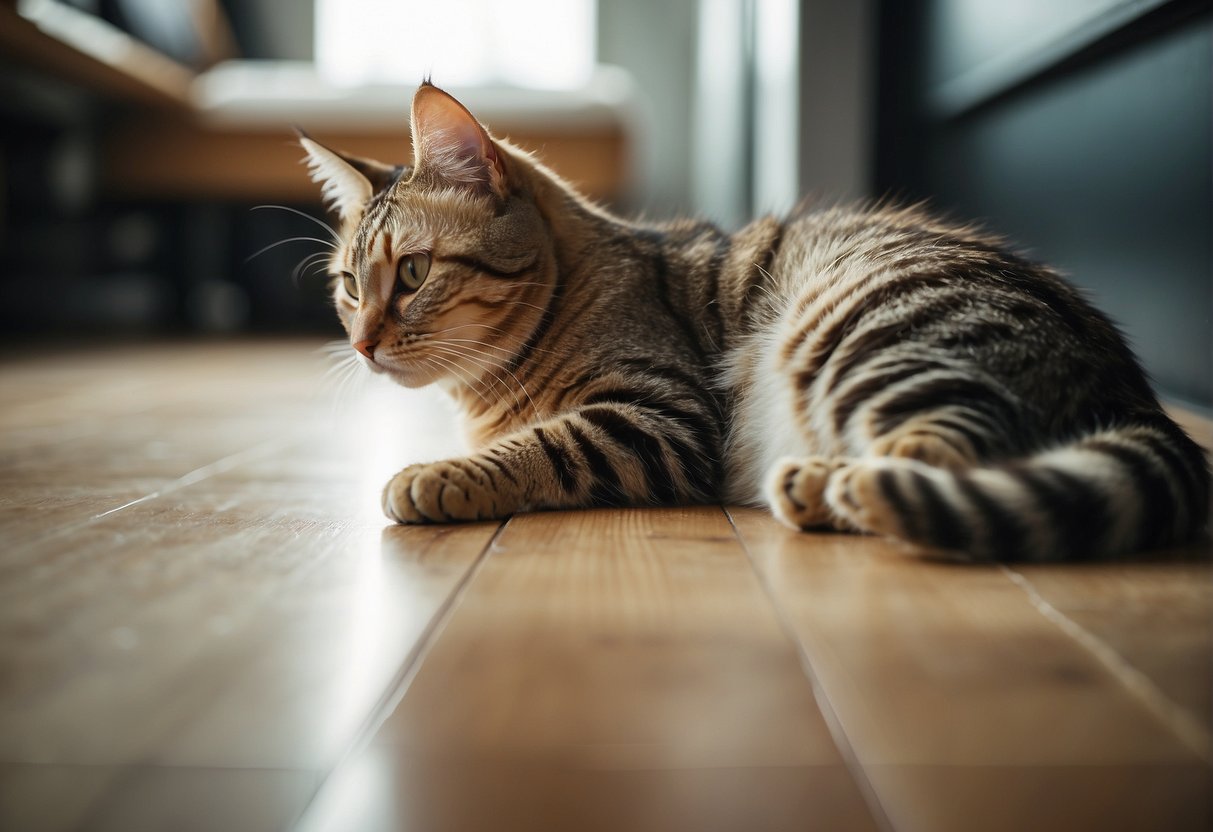
Cats vomiting can stem from a variety of issues, ranging from feeding habits to health concerns. It's important to understand when to seek veterinary help, as well as preventative measures you can take.
When should I be concerned about my cat's vomiting?
If your cat is vomiting multiple times a week, exhibits additional signs of illness, or if there's a sudden change in their vomiting patterns, these are indicators that something more serious may be going on, and you should consult your veterinarian.
What could cause my cat to vomit frequently, even if they appear healthy otherwise?
Frequent vomiting could indicate a sensitivity or intolerance to food, ingestion of foreign objects, or hairballs. If your cat seems healthy but is vomiting often, a vet check is warranted to rule out underlying health issues.
How can I prevent my cat from vomiting after meals?
To prevent vomiting after meals, feed your cat smaller, more frequent meals and ensure they eat slowly. You can also look into specially designed slow-feeder bowls to discourage fast eating.
Is it normal for an older cat to vomit undigested food?
While it may be more common for older cats to experience digestive issues, frequent vomiting of undigested food isn't normal at any age. Age-related conditions might contribute, but unexplained vomiting warrants a vet visit.
What should I do if my cat vomits yellow bile?
Vomiting yellow bile could indicate that your cat's stomach is empty. If this happens regularly, especially early in the morning or late at night, try dividing their meals to avoid long periods without food.
Are there common reasons for a cat to vomit immediately after consuming wet food?
Immediate vomiting after consuming wet food might be due to eating too quickly, allergic reactions to certain ingredients, or eating spoiled food. Observe for a pattern and discuss with your vet for the best course of action.





Comments